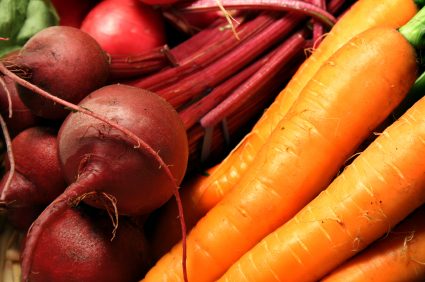5 reasons to eat more root vegetables
Nothing says healthy winter food more than beets, carrots, parsnips and turnips. Find out what they can do for you

Source: Best Health Magazine, January/February 2010
1. Reduce your cancer risk
A compound found in raw carrots reduced the risk of cancer developing in rats, according to a study published in the Journal of Agricultural and Food Chemistry. Rats that ate carrots, or feed with added falcarinol (a substance in carrots that gives the vegetable protection against fungal diseases) were one third less likely to develop full-scale tumours than rats not fed carrots or feed with falcarinol.
2. Get your folate
Add a couple of medium sliced parsnips to your veggie roasting tray and you’ll get more than 20 percent of your daily folate. This B vitamin is essential if you are trying to conceive, are pregnant or are breastfeeding, as it helps prevent neural tube defects.
3. Absorb more iron
Toss a cup (250 mL) of diced white ‘turnip into the pot the next time you make a stew or curry. It has about one third of your daily needs of vitamin C, ‘a powerful antioxidant that helps with the absorption of iron and also assists the body in making collagen for bones and cartilage.
4. Increase your exercise stamina
Drinking beet juice could help you exercise longer, according to a study published in the Journal of Applied Physiology in 2009. After drinking two cups (500 mL) of the juice daily for six days, eight male participants were able to cycle up to 16 percent longer than when they drank a placebo. The study shows how the nitrate contained in beet juice leads to an improved use of oxygen. In another study, drinking the same amount of beet juice daily was found to significantly reduce blood pressure.
5. Boost your beta
Putting carrots into your favourite winter soup or chicken pot pie lets you take full advantage of an excellent source of beta-carotene. The body converts this antioxidant into vitamin A, which is important for vision and bone growth. It also helps to regulate the body’s immune system.
This article was originally titled "Savour hardy roots," in the January/February 2010 issue of Best Health. Subscribe today to get the full Best Health experience’and never miss an issue!’and make sure to check out what’s new in the latest issue of Best Health.




